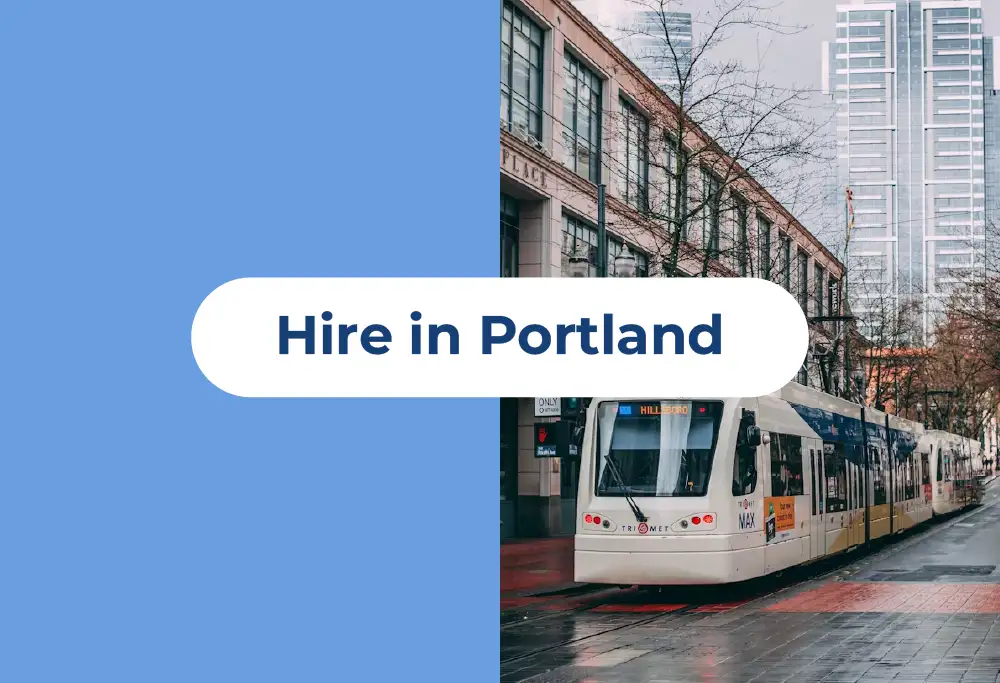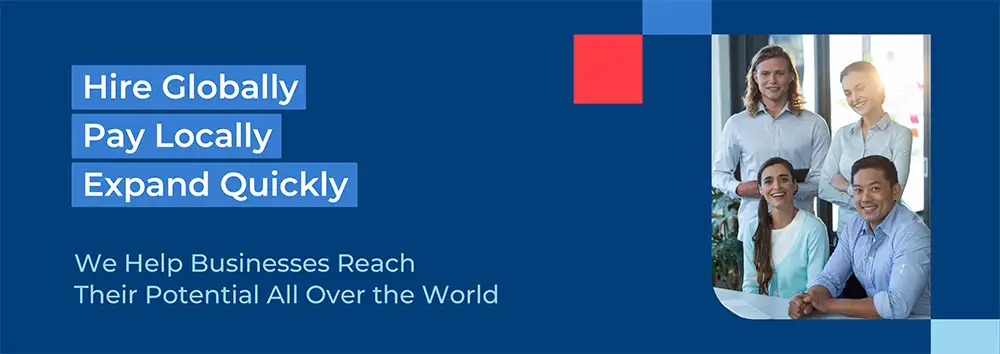Portland, the largest city in Oregon, has steadily built a reputation as a hub for creativity, technology, sustainability, and entrepreneurship. Known for its progressive culture, thriving startup ecosystem, and strong emphasis on green business practices, Portland has become one of the most attractive cities in the Pacific Northwest for companies seeking to expand.
Its location, between Seattle and San Francisco, positions Portland as a cost-effective alternative to larger coastal hubs, while still providing access to a highly skilled and educated workforce.
The city’s economic diversity, ranging from advanced manufacturing and clean technology to retail, software, and healthcare, makes it an increasingly strategic choice for hiring in 2025.
This guide covers everything employers need to know about hiring in Portland, including compliance requirements, taxation, recruitment strategies, and benefits.
How to Hire in Portland Easily in 2025
Employers entering Portland have two main approaches:
- Establishing a U.S. entity in Oregon, registering with both state and federal authorities, and managing compliance, HR, and payroll internally.
- Working with an Employer of Record (EOR), which enables companies to hire employees in Portland without creating a local entity. The EOR manages payroll, benefits, compliance, and HR administration, while the employer focuses on daily work management.
The general hiring process in Portland includes:
- Drafting clear and compliant job descriptions.
- Registering for employer tax accounts with the IRS and Oregon authorities.
- Following both federal labor standards and Oregon’s employee-focused labor laws.
- Providing benefits packages that reflect Portland’s progressive workforce expectations.
- Leveraging universities, local job boards, and professional associations for recruitment.
Why Hire in Portland? The Benefits of Hiring in Portland
Strategic Location
Portland’s location in the Pacific Northwest gives it direct access to West Coast markets and international trade. The Port of Portland and Portland International Airport (PDX) connect the city to Asia, Europe, and major U.S. destinations, making it a strong hub for logistics, trade, and global operations.
Educated and Skilled Workforce
Portland benefits from institutions such as Portland State University, Oregon Health & Science University (OHSU), and nearby universities like the University of Oregon. These institutions produce top graduates in fields such as healthcare, engineering, environmental sciences, and IT. The city also attracts creative professionals, entrepreneurs, and skilled tradespeople.
Diverse Economy
Portland’s economy includes clean energy, advanced manufacturing, healthcare, financial services, retail, and software development. The presence of multinational companies like Nike, Intel, and Columbia Sportswear underscores the city’s business strength. Its startup ecosystem further enhances its attractiveness for innovative employers.
Quality of Life and Talent Attraction
Portland consistently ranks as one of the most livable cities in the U.S., with a reputation for sustainability, culture, and outdoor recreation. This lifestyle, combined with lower costs than San Francisco or Seattle, helps attract talent from across the country.
Legal Requirements for Hiring Employees in Portland
Employers in Portland must comply with federal labor laws and Oregon’s state-specific regulations, which are progressive and employee-friendly.
Employment Contracts
Oregon follows the “at-will” employment principle, meaning either employer or employee can terminate the relationship at any time, provided it does not violate anti-discrimination or labor laws. Written contracts are not required but are advisable to establish clarity on compensation, benefits, and expectations.
Working Hours and Overtime
The standard workweek in Portland is 40 hours. Under the Fair Labor Standards Act (FLSA) and Oregon law, non-exempt employees must be paid 1.5 times their hourly rate for hours worked beyond 40 in a week. Oregon also enforces additional requirements for breaks and rest periods.
Probation Periods
Probationary periods are not mandated in Oregon but are commonly used by employers, often lasting 90 days.
Termination of Employment
While Oregon is an at-will state, employers must comply with strict anti-discrimination, retaliation, and whistleblower protections. Documentation of performance issues is recommended to minimize risks of disputes. Severance pay is not required but may be voluntarily offered.
Taxation and Social Security Contributions in Portland
Employers hiring in Portland must comply with both federal tax obligations and Oregon-specific requirements.
1. Individual Income Tax (IIT)
Oregon levies a progressive state income tax, ranging from 4.75% to 9.9% depending on income brackets. Employees must also pay federal income tax (10% to 37%). Employers are responsible for withholding both.
2. Employer Contributions to Social Insurance
Employers in Portland contribute to the following programs:
- Social Security: 6.2% of employee wages (matched by employees).
- Medicare: 1.45% of wages (matched by employees).
- Federal Unemployment Tax (FUTA): 0.6% on the first $7,000 in wages after credits.
- Oregon State Unemployment Insurance (SUI): Employer rates vary based on industry and claims history.
- Paid Family and Medical Leave Insurance (PFMLI): Oregon requires shared contributions from employers and employees to fund statewide paid family and medical leave.
3. Contribution Bases
Social Security contributions are capped at the federal wage base (about $168,600 in 2025). Medicare has no cap, though employees earning above $200,000 must pay an additional 0.9% surtax.
Work Permits and Other Requirements for Hiring Foreign Workers in Portland
As a global city with strong links to Asia and Europe, Portland attracts international professionals. Employers hiring non-U.S. citizens must comply with immigration requirements.
- Visa Sponsorship: Employers often sponsor H-1B visas (specialty occupations), L-1 visas (intra-company transfers), and O-1 visas (extraordinary ability).
- Labor Condition Application (LCA): Certain visas require filing an LCA with the Department of Labor to confirm compliance with wage and labor standards.
- E-Verify: Many Oregon employers use this system to confirm employment eligibility.
Medical and Background Checks: Some visa categories require background verification and health screenings.
Current Trends and Top Recruitment Strategies in Portland
The Portland labor market has grown increasingly competitive, especially in tech and sustainable industries. Effective recruitment strategies include:
- University Collaborations: Partnering with Portland State, OHSU, and nearby universities gives employers access to graduates in healthcare, engineering, and technology.
- Sustainability and Clean Energy Focus: Portland is a leader in sustainability. Employers in renewable energy and green industries can attract talent by emphasizing environmental values.
- Tech and Creative Industry Recruitment: Portland’s growing reputation as a tech and creative hub means companies must highlight innovation and career growth opportunities.
- Diversity and Inclusion: Portland’s diverse workforce values inclusive practices, making them a key recruitment tool.
- Flexible Work Arrangements: Many Portland professionals expect hybrid or remote work options. Employers offering flexibility are better positioned to attract top talent.
Hiring Skilled Workers vs. Entry-Level Talent in Portland
Hiring Skilled Workers
Skilled professionals in Portland, particularly in technology, healthcare, and manufacturing, expect strong benefits, career development opportunities, and alignment with sustainability values. Employers should emphasize professional training, innovation, and company culture.
Hiring Entry-Level Talent
With a steady flow of graduates from local universities, Portland offers a large entry-level talent pool. Companies can attract these workers with internships, structured training programs, mentorship, and tuition reimbursement.
Competitive Benefits in Portland
Beyond compensation, benefits packages are essential for recruiting and retaining employees in Portland. Common offerings include:
- Health, dental, and vision insurance
- 401(k) retirement savings with employer contributions
- Paid vacation, sick leave, and family leave (aligned with Oregon PFMLI)
- Tuition reimbursement and education benefits
- Professional training and development programs
- Employee wellness initiatives, including mental health support
- Flexible or hybrid work arrangements
- Sustainability-focused benefits, such as public transit support or bike programs
Hiring Solutions for Foreign Companies in Portland
International companies seeking to hire in Portland have three primary options:
Independent Contractors: Flexible but risky if misclassified under federal or Oregon law. Misclassification penalties can be significant.
Establishing a U.S. Entity: Provides full control but requires incorporation, tax registration, and compliance with Oregon’s progressive labor laws.
Employer of Record (EOR): The fastest and most efficient solution. An EOR manages payroll, contracts, and HR compliance while the company focuses on business operations. This enables rapid, compliant hiring in Portland without setting up a local entity.
Trust INS Global to Hire in Portland Today
Portland offers one of the most dynamic hiring environments in the Pacific Northwest. With its focus on sustainability, highly educated workforce, and growing reputation as a hub for technology, healthcare, and green industries, the city is an ideal location for companies expanding in 2025.
At the same time, employers must navigate Oregon’s employee-friendly labor laws, progressive tax requirements, and federal immigration rules when hiring international talent. That’s where INS Global can help.
Our Employer of Record (EOR) services in Portland simplify hiring by managing payroll, HR, compliance, and contracts on your behalf. This allows you to focus on building your team and expanding your business confidently.



SHARE